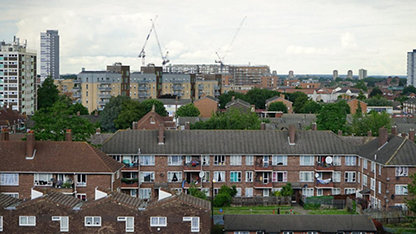Prime Minister Boris Johnson has injected new vigour into the government's devolution programme just as Labour and Conservative metro mayors and other city leaders have set aside political differences to call for more powers and control over their own destiny.
Five of England's metro mayors - Mayor of Greater Manchester Andy Burnham, Mayor of North of Tyne Jamie Driscoll, Mayor of Cambridgeshire and Peterborough James Palmer, Mayor of the Liverpool City Region Steve Rotheram, and West of England Mayor Tim Bowles - alongside leaders from cities across the country gathered in London to call on the prime minister to put more power into their hands.
The cross-party group is calling for further control over local transport and additional funding to help them transform connectivity in England's urban centres, in line with recommendations in the National Infrastructure Commission's (NIC) 2018 assessment report.
In encouraging growth of cities, the NIC recommends that metro mayors and city leaders develop and implement long-term strategies for transport, employment and housing in their areas, to support economic growth, with new powers and devolved infrastructure budgets.
The assessment's spending plans include funding for projects including Crossrail 2 in London, and Northern Powerhouse Rail linking the major northern cities, and recommends a boost in funding for major cities totalling £44bn to 2040, with cities given stable five-year budgets, starting in 2021.
In a joint statement aimed at the PM, the mayors stated: "As mayors, we are proud to represent cities and regions bursting with potential and we are working hard to deliver for our people. We have different politics and some of our regions are separated by hundreds of miles, yet we share a significant challenge.
"From North to South and everywhere in between, public transport is under strain, stifling growth and harming quality of life.
"Granting us more control over transport decisions alongside greater investment would give us the tools to transform connectivity and provide a more prosperous future for families and businesses.
"As the former Mayor of London, you know the power of devolution better than anyone. Now put your belief in our communities and hand over the keys to our destiny."
The government has confirmed it will respond officially to the Commission’s recommendations through a National Infrastructure Strategy before the end of the year and the prime minister said that he would ‘do devolution properly’ in a speech a few days later to the Convention of the North.
Mr Johnson has promised mayors more control over local rail, including fares, stations, rolling stock and service patterns. He has also suggested that communities outside of the combined authorities could get similar powers.
The prime minister also proposed a ‘Northern Powerhouse growth body’ to stimulate the region’s economy and indicated that new deals would soon be agreed in Yorkshire to create more combined authorities. He also promised to level the playing field by giving more powers to areas such as Tees Valley and North of Tyne to match those given to Greater Manchester.
In considering that the government’s devolution programme has been lacklustre for some time, RICS is pleased to hear the prime minister making these commitments.
RICS has supported devolution of powers over transport infrastructure, housing delivery and economic development to strong regional mayors on the basis that investment decisions are better taken by local leaders rather than officials in Whitehall.
Indeed, RICS-backed research and examples from cities around the globe, such as Stockholm and Vienna, have been highlighted by RICS as part of the World Built Environment Forum, and illustrate how devolution and strong local leadership can unlock the full potential of city regions.
Going forward, RICS believes metro mayors, combined authorities and city and regional leaders must tackle regional inequalities to ensure people have the homes, jobs and opportunities they deserve across the UK.
The view from RICS: sector by sector
Planning:
- Develop regional strategic plans to ensure public and private investment is coordinated. Given the very different issues faced across the UK, this is best done at a regional/local level.
- Strengthen local authority planning teams to better deal with major planning applications.
- Work closely with developers, house builders and land owners to ensure the supply of developable land does not dry up following recent changes to the National Planning Policy Framework (NPPF) and Planning Policy Guidance (PPG).
Housing
- Encourage greater use of Modern Methods of Construction to speed up delivery of new housing.
- Enable more local authorities to partner with private companies to build new council housing.
- Encourage the use of all housing tenures – for example, council housing, build to tent, private rented, shared ownership as well as market sale.
- Support SME/local builders with local bank funding.
Town centres and high streets
- The national focus on city-led growth has led to fears for smaller towns and high streets losing out on investment. Authorities must develop an inclusive economy strategy.
- The retail sector is going through a fundamental period of change and local authority planners must take urgent action to redesign town centres and high streets away from being retail-led to being community-led.
- Ensure that Permitted Development Rights (PDRs) do not lead to unintended outcomes. Oversight is required from planning professionals, especially to ensure commercial to residential conversions are up to standard.
Transport, digital and energy infrastructure
- Government at all levels must ensure that delivery agents have adopted the highest standards, such as International Construction Measurement Standards (ICMS), to better understand, control and deliver large projects.
Looking ahead
Six new metro mayors were elected in May 2017 each leading a combined authority in England. A further two have been elected since then. Taken together, the eight metro mayors cover an area with almost 12m residents (not including London). Four of the mayors will face an election battle in May, next year; Tees Valley, Greater Manchester, Liverpool City Region and West Midlands.
Find out how you can help us engage with government
About the author

Geoff White
Policy Manager (North & Midlands), RICS
Geoff is part of the RICS UK External Affairs team which addresses policy, public affairs and press activity to support the organisation’s aims of building influence, credibility and profile to gain recognition of professional standards. Working closely with RICS members, Geoff identifies the challenges and opportunities facing those working in the profession in order to support the delivery, within a public interest mandate, of a vibrant and sustainable land, property and construction sector.



















